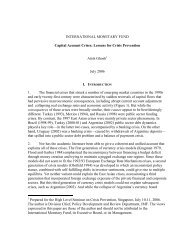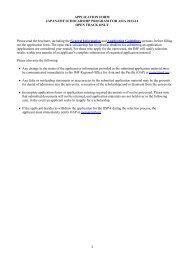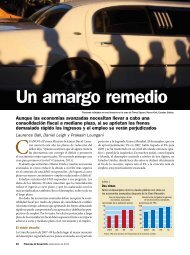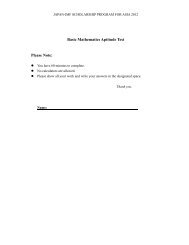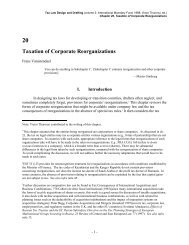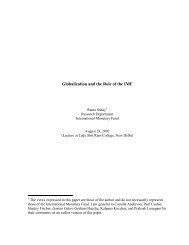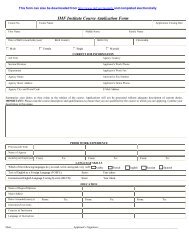Insolvency â why a special regime for banks? by Eva Hupkes ... - IMF
Insolvency â why a special regime for banks? by Eva Hupkes ... - IMF
Insolvency â why a special regime for banks? by Eva Hupkes ... - IMF
You also want an ePaper? Increase the reach of your titles
YUMPU automatically turns print PDFs into web optimized ePapers that Google loves.
Contrary to the majority of European legislators that chose to apply ordinary insolvency rules<br />
to <strong>banks</strong>, the United States Congress opted very early <strong>for</strong> a <strong>special</strong> bank insolvency <strong>regime</strong>.<br />
Under the National Bank Act of 1864, it was the Comptroller of the Currency, rather than the<br />
judiciary who was empowered to appoint a receiver <strong>for</strong> national <strong>banks</strong>. 31 Alongside federal<br />
regulation, most American states established their own statutory <strong>regime</strong>s <strong>for</strong> supervising<br />
<strong>banks</strong> and resolving bank insolvencies. The Bankruptcy Act of 1898 explicitly excluded<br />
<strong>banks</strong> from its coverage and continues to do so. 32 At its creation, in 1933, the FDIC became<br />
the exclusive receiver <strong>for</strong> failed national <strong>banks</strong>, as well as the receiver <strong>for</strong> state chartered<br />
<strong>banks</strong> at the discretion of state authorities. The existence of deposit insurance created<br />
additional reasons <strong>for</strong> <strong>special</strong> bank insolvency rules, such as saving the insurance fund and<br />
deferring to FDIC expertise. 33<br />
Should other countries do as the United States and adopt a separate body of rules <strong>for</strong> bank<br />
insolvencies? Who should be in charge of the resolution of bank failures: the banking<br />
supervisor or, as under general insolvency law, the courts, - or should there be some <strong>for</strong>m of<br />
division of labor between them?<br />
Some maintain that bank supervisors should deal only with “living” <strong>banks</strong>, while “fatally ill”<br />
or “dead” <strong>banks</strong> should be turned over to the “mortician”, the bankruptcy court. This<br />
argument goes as follows: since an insolvent bank can no longer conduct the business of<br />
banking, “it is no longer a bank” and thus should be treated just like any other bankrupt<br />
corporation. 34 Yet, this argument holds only in part. Banks are already subject to <strong>special</strong><br />
regulation which determines the conditions of their operation, it is, there<strong>for</strong>e, only the bank<br />
supervisor – and not a bankruptcy judge or a meeting of creditors - who is in a position to<br />
determine whether a bank is viable. Thus, the bank supervisor must have a voice in the<br />
insolvency procedure.<br />
Should the bank supervisor be in charge of the entire insolvency procedure? Or, should the<br />
procedure be turned over to a bankruptcy court? If so, at what stage in the process? While<br />
insolvency <strong>regime</strong>s differ widely from country to country with respect to the extent to which<br />
they rely on <strong>special</strong> procedures <strong>for</strong> resolving bank failures, there is a marked trend toward<br />
31 See Peter P. Swire, Bank insolvency law now that it matters again, 42 Duke L.J. 469<br />
(1992); also available via the Internet at http://www.acs.ohiostate.edu/units/law/swire1//psduke.htm.<br />
32 11 U.S.C. § 109(b)(2), (3), available on the Internet at http://uscode.house.gov/usc.htm.<br />
33 See Testimony of Chairman Alan Greenspan be<strong>for</strong>e the Committee on Banking, Housing,<br />
and Urban Affairs, U.S. Senate, April 23, 2002, accessible via the Internet at<br />
http://www.federalreserve.gov/boarddocs/testimony/2002/20020423/ .Mr. Greenspan<br />
observes that deposit insurance weakened the market discipline to control risks that insured<br />
depositors would otherwise have imposed on <strong>banks</strong> and thrifts and that the ensuing reduced<br />
market discipline and increased moral hazard intensified the need <strong>for</strong> government supervision<br />
to protect the interests of taxpayers and, in essence, substitute <strong>for</strong> the reduced market<br />
discipline.<br />
34 J. Ashmead, In re Colonial Realty Co, 60 Brooklyn Law Revue 517, 519 (1994)<br />
(comparing the relevant rules under the Bankruptcy Code to the procedure under the Federal<br />
Deposit Insurance Act governing bank insolvencies).<br />
8





